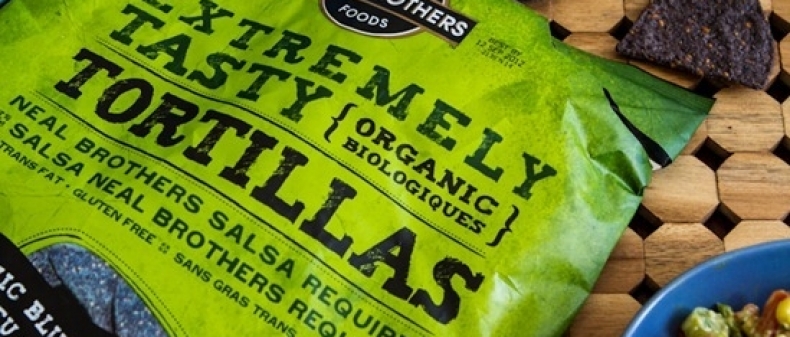
image: ohsheglows.com
Over the past few years, Canadians have seen an explosion in the accessibility, visibility, and associated popularity of organics. Agriculture Canada reports that in 2008, Canadians spent $2 billion dollars on organic products, a 66% increase from 2006. But despite these positive trends, still only 1.7% of farmland in Ontario is certified organic, calling to question the challenges and advantages of the coveted organics stamp. From the perspective of a consumer, I have always felt that the health and environmental benefits of eating organics significantly outweighs the slightly higher price. But how do the pros and cons of organics stack up on the other side of the supply and demand equation? What does this shift look like for farmers, manufacturers and distributors? This month, following my salsa sample-fest at the Gluten Free Garage, I sat down with Peter Neal from Neal Brothers, a Toronto- based organic food distributer, to get a sense of how the organics revolution has played out for him.
Twenty-five years ago, before the days of nutritional buzz words like “organics” and “gluten free,” the Neal Brothers introduced their first food product in stores- a bag of conventionally prepared gourmet croutons made in their mother’s kitchen. Their goal was simple and their approach made sense- provide Canadian families with healthy, more natural food products by sourcing out farmers and manufacturers with the best quality natural ingredients. Soon after, the Neal brothers discovered that for their goal to be fully realized, they needed to explore the possibility of integrating the then niche market of organics into their line. Fast forward through a few solid years of research, and by the early 90s- a mere decade prior to any official Canadian organics standards were even published- Neal Brother’s organic corn chips had hit stores.
The choice to go organic was a bit of a ballsy, challenging endeavor, in that they knew it was going to cost them time, energy, and money to pull off. As a distributor it would mean that 95% of their products’ ingredients would need to be certified organic according to the Canadian Food and Inspection Agency’s (CFIA) standards, and the manufacturing facilities where they were processed would be subject to annual inspections. Back when he released his chips, there were literally no Canadian certifying bodies to conduct these sorts of evaluations, making sourcing organic ingredients and productions difficult for the Neals. Most smaller scale also steered clear of the organics market out of fear that better working conditions for farmers, more humane animal rearing, and smaller unadulterated crop outputs would cause their profits to plummet. In contrast, Peter recalls a number of bigger “nefarious corporations” who could afford the risk, exploiting the novelty of organics, “charging much more than they needed,” while simultaneously offering products packed with MSG, hydrogenated oils, and salt. It just goes to show that “organic” is not a catch-all phrase equivalent of healthy wholesome food. Thankfully, unlike some of their “Big Food” competitors, the Neal Brothers’ embarked on the organics business out of a desire to support a “long-term healthy, sustainable” food system, and so in an effort to encourage and educate rather than alienate consumers from going green, they absorbed much of the additional expense themselves.
Since then, the organics landscape has certainly changed for consumers and distributors alike. There are large sections in the grocery store reserved for organic goods, and consistent research updates evaluating organics’ health-promoting, environmental and economical implications. In response, consumers are demanding more organic products not necessarily to better nutrition (for which the evidence is not clear), but rather because its manufacturing process reduces the toxic load on our environment, moderates off-farm pollution, protects against the consumption of genetically-modified foods, and often engages in more ethical farming practices, both for farmers and for animals. I am actually most encouraged by early research suggesting that choosing organic foods reduces an individual’s exposure to antibiotic resistant bacteria, a shift that may have significant long-term impacts on public health. And while “organic” foods may lose their “health halo” when they’re loaded with sugar, fat or salt, I think that balance is the fundamental framework of any healthy eating regime. So treat yourself to that bowl of cheese pops, honey mustard pretzels, or the chips you crave in moderation. When your indulgences are organic, you’ve got a lot more than great flavour to feel good about!
And if I haven’t already sent you running for an organic snack, then you’re going to want to check out the Neal Brothers who will be sponsoring Abbey’s Kitchen Stadium (AKS) for your fix! Abbey’s Kitchen in partnership with the Toronto Standard, and presented by Forty Creek Whisky brings you the hottest pop-up food competition this year to help raise funds for local food initiative, My Food My Way (MFMW). On May 26th from 12-4 p.m. at Toronto’s MOD Club, four top chefs will be preparing two dishes each using a secret ingredient that will be revealed to the public on site. Guests will be able to purchase the dishes and drinks from the bar, enjoy the live DJ, buy gift basket raffle tickets, and finally, watch as a panel of celebrity judges choose the winning chef who will move onto the championship in October. Tickets are available for $10 at uniiverse.com, food and drinks will be sold for $6, and a portion of proceeds will be donated to the MFMW.
The chosen chefs for battle one include:
Matt Basile of Lisa Marie (NEW) & Fidel Gastros
Matt Pettit of Rock Lobster Co.
Rocco Agostino of Enoteca Sociale & Pizzeria Libretto
Bruce Woods of Woods Restaurant (NEW)
The delectable dishes will be evaluated by:
James Cunningham (Eat St)
Bruce Croxon (Dragon’s Den)
Jordan Hastings (Alexisonfire Drummer, Co-Founder Dine Alone Foods)
Peter Neal (Neal Brothers Owner)
* This article was posted as part of Toronto Standard’s media sponsorship of Abbey’s Kitchen Stadium, of which Neal Brothers is a sponsor.
____
Abbey Sharp is a Dietitian (RD), home chef, food writer, blogger & media personality. Follow her on Twitter at @AbbeysKitchen.
For more, follow us on Twitter at @torontostandard, and subscribe to our newsletter.














